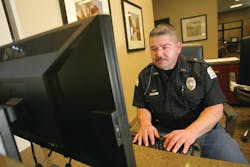You’re a law enforcement vet with an eye on leadership or a career change. What happens next?
Law enforcement veterans will tell you that you should always be thinking about what you want to do next. Do you aspire to advance in law enforcement? Or, do you intend to retire and start another career? Knowing your goals will help you to make the right decisions to get the education and experience you need to reach your career goals.
Ways to increase your leadership experience
If you are missing direct experience in leadership positions there are things you can do in your current role. Tim Hardiman is a 23-year veteran of the NYPD who retired as an inspector serving as the commanding officer of the 47th precinct in the Bronx. He recommends that officers request assignments that have leadership components.
Such opportunities can be anywhere, and sometimes can occur when you least expect it—so it’s important to always be prepared, said Scott Roberts. Roberts has been in law enforcement for more than 20 years, starting as a corrections officer in Connecticut. He eventually transferred to a probation agency in Georgia, where he worked directly with police officers to locate wanted fugitives. This experience inspired him to go to the academy to become a sworn officer. After graduating, he worked as a police officer for several city and county agencies in Georgia.
In one agency, Roberts rose to the rank of captain, making him second-in-command and then, due to sudden staffing changes, he found himself in the role of interim chief.
“When I went to work that day I did not think I would leave as the one in charge, but sometimes that is how it happens, so you always need to be learning and improving your skills,” he said. “You never know when the window of opportunity will open—sometimes you find it, other times it finds you!”
While his role as chief was intentionally short-term, the experience gave Roberts a taste of what it was like to hold a command position and he knew he wanted more.
“That experience was my drive to go back to school because I wanted to work my way through the ranks and have the education to go with it so I could get back to that command position and hopefully be chief again one day,” he said.
While not everyone will have such leadership opportunities like Roberts had, it is important for officers to take every available opportunity to demonstrate leadership. Volunteering for roles shows ambition and demonstrates to superiors that you want additional responsibility. It is also an opportunity to learn from the experience. Good leaders take responsibility for decisions and recognize that mistakes are often the best learning opportunities.
It is also important to document such experiences. Be sure to take notes (either mentally or physically) about each leadership role. This exercise can help you consciously reflect on the experience and look at it from a wider perspective. It can help you learn from the experience and make adjustments. Just as important, this can also help you present the situation and lessons when it comes time to apply for that promotion. If you have given your leadership experience some deliberate thought and reflection, it will show through during your interview.
Remember that leadership is part of teamwork
Never forget the adage: A leader is only as good as his (or her) team. To be successful in law enforcement, you must be a team player. Like it or not, your career success often depends on how well you work with others. Beyond just career success, though, the reality is that your life and the lives of your fellow officers depend on the existence of strong teams. As a law enforcement leader, it is very important for you to communicate and demonstrate the importance of team work.
Dr. James Reilly knows firsthand what it’s like to have to depend on your teammate in life-threatening situations. He spent 13 years as an astronaut for NASA and ventured into space on three missions, completing five space walks. During these space missions—characteristically lasting about two weeks—all the astronauts worked 16-hour days, completing many tasks where any level of failure could lead to death. Currently, Reilly is associate vice president at American Public University System (APUS) and has spent the last year traveling the country giving presentations to groups of law enforcement agencies about how to build strong teams.
“A high level of trust must exist among members of the team, which can sometimes be easy and sometimes difficult,” he said. You don’t necessarily have to like members of your team, he said, but you have to respect them. All leaders and team members must realize that respect cannot be demanded, it must be earned (see sidebar for Reilly’s recommendations about How to Earn the Respect of Others).
Whether you are a seasoned leader or an aspiring one, take every opportunity to establish yourself as a team player and as someone who deserves respect from others at every level. Consider it part of your leadership responsibilities to foster and nurture a sense of teamwork among those you lead.
For many people, leadership is not a natural trait, but that doesn’t mean you can’t be an excellent leader. It just means you need to put more work into your personal leadership development, which often means pursuing further training and/or formal education.
Focusing on career development through formal education
Advancing in your career also involves formal training and education. Remember that education does not end with a single degree. It can be very beneficial for police officers to adopt an attitude as a lifelong learner. (see sidebar: Why You Should Get a Degree)
If you already have an advanced degree, you may not want to earn a full second degree, but there are still many ways to demonstrate that you are staying abreast of new theories and laws, technology, and other developments in law enforcement, as well as keeping your research and writing skills sharp.
For LEOs without a formal degree:
While there have always been educational standards for promotion, more officers are entering law enforcement with a degree, making competition steep. Don’t disadvantage yourself by being the candidate without a degree—more than ever departments are using education as a way to weed out applicants.
Many officers think it makes sense to get a degree in criminal justice. However, even if you plan to spend your entire career in law enforcement, Hardiman recommends getting a degree that broadens your perspective. After all, you already have knowledge and experience about criminal justice, so use education to “fill the gap” on your resume and help make you a well-rounded candidate.
Degrees that you should consider:
- Public Administration A degree in public administration can give you experience in budgeting, planning, procurement and administrative law—the tools you need to know about hiring, firing and promotion.
- Business Administration/Management Especially if you plan to move into the private sector, business administration can teach you everything from organizational behavior and leadership styles to budgeting and HR practices.
- Emergency and Disaster Management (EDM) As a police officer, you have likely participated in some aspect of EDM, whether through training or real-life scenarios. This field gives you a broader perspective of how public safety departments interact with municipalities and private businesses.
- Homeland Security A degree in homeland security can broaden your perspective beyond law enforcement. Great for people who want to move into the government sector.
For LEOs with a degree who want to demonstrate continued education:
A good way to continue your education without committing to a full degree is to pursue a certificate program, which allows working law enforcement professionals to document accredited learning. Certificate programs can also be used to focus on a particular skill to complement a more general degree. As one example, a law enforcement executive who holds a master’s degree in criminal justice may seek to enter a certificate program in emergency and disaster management. The certificate has more focus than the degree and demonstrates the development of specific skills.
There are certificates that can specifically help you develop leadership competencies in law enforcement. For example, American Military University recently launched undergraduate and graduate certificates in Executive Law Enforcement Leadership. This program includes six courses that help prepare law enforcement command personnel for advanced leadership roles, ranging from strategic planning to grant writing classes. The university also recently launched a cohort for this certificate program so that participants can go through this program with the support of other like-minded officers from around the country.
Regardless of what approach you take to enhance education, it is important to be a dedicated lifelong learner. After all, the field of law enforcement is constantly changing, and education is a valuable way to improve the knowledge and skills needed to pursue opportunities for advancement.



